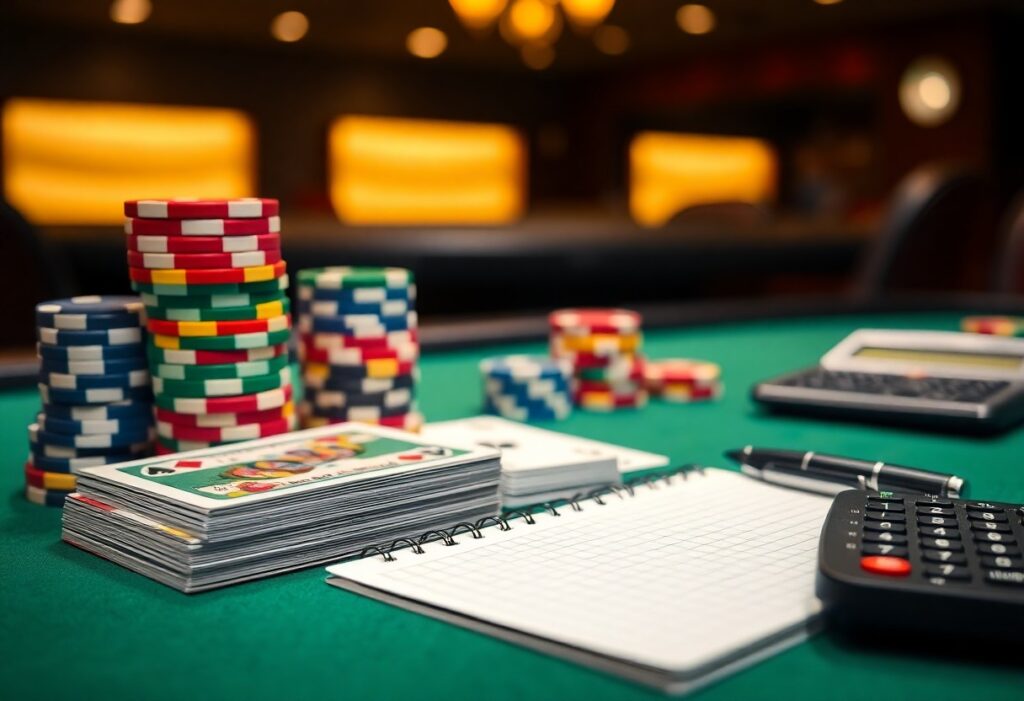
Bankroll management is crucial for long-term success at the casino poker table. By setting clear limits and sticking to them, players can minimize losses and avoid the tempting pitfalls of chasing losses. Understanding when to scale back and recognizing the signs of emotional play can help maintain focus and control. Utilizing a structured approach to betting can also enhance your overall experience, allowing for a more enjoyable time at the tables while still maximizing potential winnings.
Types of Casino Poker Games
Understanding the different types of casino poker games is vital for casino players. Each game has unique rules, strategies, and payouts that can drastically affect your gameplay and bankroll management. From cash games to tournaments, knowing the right choice for your style is key to success. Here are some popular choices:
- Texas Hold’em
- Omaha
- Seven Card Stud
- Pineapple
- Crazy Pineapple
After selecting a game, understanding its dynamics can enhance your performance.
| Game Type | Overview |
| Texas Hold’em | Most popular, players make the best hand from two hole cards and five community cards. |
| Omaha | Players receive four hole cards; must use two with three community to create a hand. |
| Seven Card Stud | No community cards; players build hands from their own seven cards. |
| Pineapple | A variant of Texas Hold’em where players discard one hole card after the flop. |
| Crazy Pineapple | Similar to Pineapple, but players discard their third hole card after the turn. |
Cash Games
In cash games, players buy in for a specific amount and play with that money directly. Blinds remain constant, allowing players to enter and leave the game at any time. This format is ideal for those who prefer flexibility, as winning or losing occurs without a set time limit. The primary focus is to maximize profit per hand while managing your bankroll efficiently.
Tournaments
Tournaments involve an initial buy-in for chips that represent a tournament stake. Players compete until one emerges with all the chips. Each hand contributes to a player’s standing in the tournament, making strategy vital. Tournaments often feature escalating blinds that require consistent adaptation or risk being blinded out.
Tournaments not only test your skill and strategy but also provide the potential for substantial payouts. Each player starts with the same chip stack, creating a level playing field. The blinds increase over time, pushing players to adopt aggressive strategies and maximize their chip stacks. Understanding tournament structure and timing your aggression can lead to advantageous positions, while fierce competition can challenge even seasoned players. Balance your play according to your chip size and the stage of the tournament to enhance your chance of making it to the final table.
Tips for Managing Your Bankroll
Effective bankroll management is paramount for a successful poker experience. Adopting a disciplined approach ensures you withstand losses while maximizing wins. Here are necessary tips:
- Establish a solid budget before playing.
- Stick to set limits for each session.
- Gradually increase bets only when it’s appropriate.
- Stay aware of your bankroll and avoid emotional decisions.
Thou must remain vigilant in your financial strategy.
Setting a Budget
Setting a budget should be your first discipline. Determine an amount you can afford to lose, ensuring it doesn’t interfere with necessary expenses. This fixed budget creates a safety net and helps maintain emotional stability. Aim to define separate budgets for different sessions, keeping one for cash games and another for tournaments to allow flexibility in your play style.
Tracking Your Wins and Losses
Monitoring your wins and losses is vital for understanding your performance. Keeping a detailed log can illuminate trends and patterns in your strategy, showing what works and what doesn’t. This analysis is necessary for making informed adjustments to your game and avoiding repeating mistakes.
Utilizing tools like spreadsheet software or dedicated poker tracking apps can streamline the process. Record every session’s details, including date, duration, buy-in amounts, and outcomes. Reviewing this data regularly will help identify strengths and weaknesses, ultimately enhancing your decision-making. Thou shall keep a clear record, leading to improved play and bankroll management.
Step-by-Step Guide to Effective Bankroll Management
| Assessing Your Skill Level |
Understanding your skill level in poker is necessary for tailored bankroll management. Beginners should adopt a conservative approach, limiting their buy-ins to 1-2% of their total bankroll. Intermediate players might increase this to 3-5%, while advanced players can allocate up to 10% for cash games, depending on variance and session lengths. |
| Choosing the Right Limits |
Selecting appropriate limits is vital for sustaining your bankroll. Picking games where the stakes align with your skill level and financial comfort prevents unnecessary risks and allows for a longer playing time. |
Choosing the Right Limits
Choosing the right limits directly impacts your overall poker experience and ability to manage your bankroll efficiently. Opt for stakes where you possess a clear advantage over your opponents; for example, if you’re comfortable at $1/$2 No-Limit Hold’em, playing at this level can help mitigate risks. Aiming for no more than 5% of your bankroll at any single table ensures you can withstand losing streaks and allows ample time to recover without depleting your funds. Keeping emotions in check when selecting limits will solidify your long-term success in poker.
Key Factors Influencing Your Success
Several key factors significantly impact your poker success. Understanding these elements can enhance your gameplay and ultimately your winnings. Essential aspects include:
- Knowledge of the game
- Skill level in reading opponents
- Money management techniques
- Emotional control during play
Perceiving these factors as interconnected will help you make informed decisions at the table.
Understanding Odds and Probabilities
A solid grasp of odds and probabilities is fundamental for decision-making in poker. Knowing how to calculate pot odds and implied odds can enhance your betting strategy. For instance, if the pot is $100 and it costs you $20 to call, the pot odds are 5:1, making it a favorable situation if your chances of winning exceed that ratio.
Player Psychology
Successful poker players recognize the importance of player psychology. Understanding your opponents’ motives and emotions can provide a strategic edge. Reading body language and betting patterns often reveals whether they are bluffing or holding a strong hand. Staying aware of your psychological state also helps prevent impulsive decisions during high-pressure moments.
In-depth knowledge of player psychology allows skilled players to exploit weaknesses in their opponents’ strategies. For instance, a player on tilt – emotionally affected by recent losses – may make rash decisions. Conversely, recognizing when to be conservative or aggressive based on observed tendencies can significantly influence outcomes. Learning to remain calm and collected while deciphering the mental states of others ultimately shapes a player’s edge in competitive environments.
Pros and Cons of Different Poker Strategies
| Pros | Cons |
|---|---|
| Clear game plan | Can be predictable |
| Increases winning chances | Requires discipline |
| Limits losses | May miss opportunities |
| Easy to stick to | Can lead to a tight style |
| Effective against rookie players | Requires knowledge of opponent habits |
Tight vs. Aggressive Play
Tight-aggressive play combines selective hand choices with a proactive betting approach, often leading to a solid strategy that maximizes winnings while minimizing losses. This style punishes loose players while capitalizing on strong hands, promoting a disciplined yet assertive mindset. However, obsessively sticking to this method may result in missed opportunities against less experienced opponents who play unpredictably.
Bluffing and Its Risks
Bluffing can be a powerful tool in poker, creating opportunities to win pots without holding the best hand. However, it’s risky; failing to read the table correctly can lead to significant losses. Players must evaluate their opponents’ tendencies and stack sizes to bluff effectively, understanding that over-reliance can lead to being perceived as untrustworthy.
While bluffing can intimidate weaker players and create a fear factor, the consequences of unsuccessful bluffs can be severe. Stake sizes, table dynamics, and player profiles influence successful bluffing. Engaging in this tactic without a sound strategy may lead to a blow to your bankroll and diminish your credibility among opponents. Being too frequent with bluffs can also invite counter-bluffs, resulting in a cycle of losses and eroding confidence in genuine strong hands.
Common Mistakes to Avoid
Avoiding common pitfalls can significantly enhance your poker game and bankroll management. Being aware of frequent mistakes that players make not only optimizes your chances but also solidifies your position at the table. Practice self-awareness and engage critically with your gameplay to steer clear of costly errors that could derail your strategy and financial stability.
Chasing Losses
Chasing losses is a dangerous mindset where players attempt to recover lost funds by increasing their bets or playing recklessly. This often leads to deeper financial trouble, as emotional reactions cloud judgment and leads to poor decision-making. Developing a strong understanding of when to walk away is necessary for maintaining a viable bankroll.
Emotional Decision-Making
Letting emotions dictate your poker play can lead to poor choices and significant losses. Strong feelings like frustration, anger, or excitement often sway players away from logic and strategy. It is vital to approach the game with a clear mind, ensuring decisions are based on sound reasoning rather than fleeting emotions.
Emotional decision-making frequently manifests in impulsive plays after a bad beat or unexpected outcome. For instance, after losing a big hand, players might increase their bets in an attempt to “make it back,” which typically results in even greater losses. Players who don’t recognize when their emotions are influencing their choices often find their bankroll dwindling faster than expected. Practicing discipline and implementing techniques such as taking breaks or setting limits can help in mitigating emotional responses and maintaining strategic focus throughout the game.
To wrap up
Drawing together important strategies for staying smart and managing your bankroll at the casino poker table can significantly enhance your experience and success. By setting strict limits, understanding game dynamics, and maintaining emotional control, players can avoid impulsive decisions that jeopardize their funds. Additionally, practicing disciplined betting techniques and continuously improving your skills will bolster your confidence and decision-making abilities. Ultimately, a calculated approach to bankroll management will help ensure that your time at the poker table remains enjoyable and financially sustainable.
FAQ
Q: What strategies can I use to manage my bankroll effectively at the casino poker table?
A: To manage your bankroll effectively, set a specific budget for each gaming session and stick to it. Divide your bankroll into smaller units for each session or tournament to avoid overspending. Additionally, adjust your bet sizes according to your bankroll size; for example, consider using the 1% rule, where each bet is no more than 1% of your total bankroll.
Q: How can I improve my decision-making skills at the poker table?
A: Improving decision-making involves studying poker strategies, understanding pot odds, and assessing your opponents’ play styles. Practice regularly, analyze your hands, and review outcomes to identify patterns in your gameplay. Keeping emotions in check and avoiding tilt will also enhance your overall decision-making process.
Q: What are the signs that I should take a break from playing poker?
A: Signs that you should take a break include feeling frustrated or angry, experiencing fatigue or distraction, and making impulsive decisions during gameplay. If you find yourself exceeding your set bankroll limits or losing concentration, it’s a good idea to step away to regain focus and assess your strategy.



